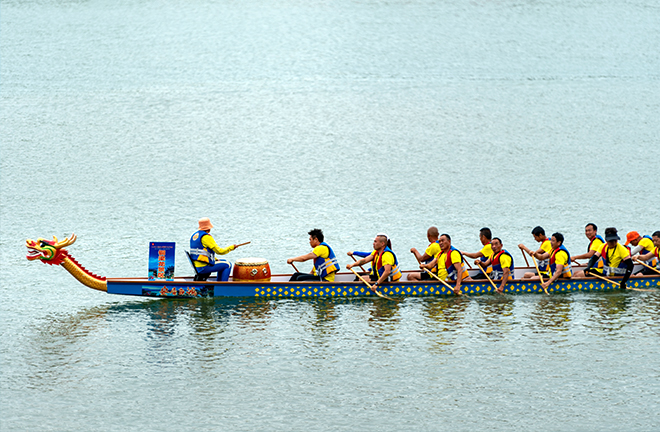Constructing developmental folklore studies

Dragon boat races are held to celebrate the Dragon Boat Festival, a traditional Chinese holiday which occurs on the fifth day of the fifth lunar month. Photo: TUCHONG
Mr. Zhong Jingwen, recognized as “the father of Chinese folklore studies,” once defined folklore as “the life culture created, enjoyed, and inherited by the general public of a country or nation.” Folklore is a collective cultural phenomenon formed and passed down from generation to generation within a particular social group in the course of production and social life over time. It reflects people’s lifestyles and modes of production as well as their understanding of and attitudes towards nature, society, history, thought, emotions, and life.
Life-based
Human growth is a process of both socialization and “folklorization.” A person’s growth, from birth to old age, is accompanied by folkloric traditions, such as birth ceremonies, coming-of-age ceremonies, weddings, longevity celebrations, and funerals. Folklore pertains to material, social, and spiritual life, encompassing folk beliefs, art, festivals, rituals, literature, language, and games.
Production folklore is formed in the labor process, everyday folklore emerges in daily life, seasonal folklore arises from seasonal changes, and normative folklore originates in civic activities. Chinese anthropologist Gao Bingzhong notes that folkloric customs are expressions of universal patterns of life culture, and their formation and structure are thoroughly replicated as a relatively stable unity in people’s lives. Folklore is characterized by everyday life and patterned phenomena, which have developed based on people’s common needs and common psychology.
People-centered
People create, pass down, and develop folk culture through production activities and daily life. Folk culture serves as an effective means of understanding oneself, others, and the world, and is an important channel for self-expression, communication, and enhancing friendships. Therefore, folk culture can be regarded as a “culture about human life.”
Folk culture embodies people’s life pursuits across time and space. It exists in various forms and reflects collective habits, beliefs, and values. For instance, traditional Chinese society primarily relied on agriculture. Its folklore was accumulated around farming and possessed attributes of agrarian societies.
Folk culture arises in response to the needs of social life and plays a crucial role in its existence and development. Chinese folklore studies fundamentally aims to facilitate the effective preservation, inheritance, and development of folklore and enhance people’s well-being, which constitutes the value and significance of folklore in the contemporary era.
Development-oriented
The fluidity of life and the variability of society drive the development of folklore and give rise to new folk culture. Modern folklore studies must embrace a developmental approach on the basis of examining the realities of people’s lives and social practices, while also deeply investigating the development patterns of folk culture and its future trends.
First, a developmental perspective of folklore should be adopted. The development and evolution of folklore is considerably affected by various factors such as its own cultural genes, the geographical conditions in which it is situated, the ever-changing socio-economic environment, rapid technological advances, and the influence of foreign culture. While many traditional folk phenomena are gradually abandoned under the pressure of new lifestyles, new folk phenomena continue to arise.
Second, folklore should be delineated into its past, present, and future forms. Folk culture features both conservatism and openness, and involves both inheritance and innovation. It is not only a legacy of historical traditions but also meets the practical needs of life and lays the foundations for future development. Folklore studies should consider folklore as both cultural heritage and a part of contemporary life, and conduct forward-looking research on future forms of folklore development.
Third, the “authenticity” of folklore should be understood dialectically. “Authenticity” requires that the original forms and features of folkloric practices be maintained and historical truth be respected in the process of folklore preservation. However, due to the dynamic nature of life, folklore cannot possess absolute authenticity. Developmental folklore studies advocates for dynamically preserving folk culture, as dogmatically pursuing the preservation of folklore authenticity is neither possible nor necessary.
Fourth, research on contemporary living folklore should be emphasized. Mr. Zhong Jingwen perceived folklore studies as a contemporary discipline for understanding the everyday cultural life of ordinary people. Focusing on the “life world” of contemporary people and contributing to their daily lives are core concepts in developmental folklore studies.
In short, contemporary folklore studies should track how people adjust their lifestyles to keep pace with the times and technological advancements, trace the changes in people’s emotions, values, and life choices, delineate the trajectories of folk culture inheritance and development from generation to generation, and explore how the content and forms of folk culture are enriched though people’s life practices. Only by practically serving society can contemporary folklore studies fully demonstrate its significance and value.
Huang Yonglin is a professor from the National Research Center for Cultural Industry at Central China Normal University.
Edited by WANG YOURAN
